How to Keep Dogs Out of the Trash
As an Amazon Associate, I earn from qualifying purchases. We may receive a commission for purchases made through these links. This site also contains affiliate links to products besides Amazon, like Etsy. We may receive a commission for purchases made through those links too (at no additional cost to you).
Tips to Keep Your Dog out of the Trash
Most dogs will go through a phase of getting into things that they are not supposed to. Some dogs are more problematic than others when it comes to getting into and eating things that aren’t healthy for them. As owners, it is up to us to make sure we keep our pets safe and to teach them to stay out of things like trash that can cause them harm. Here are some tips on how to keep dogs out of the trash if you are dealing with a dog that has developed this bad habit or if you want to start developing good habits with your puppy.

Why it’s Important
Preventing our pets from getting into the trash is important for several reasons. The main reason is their health and safety. The trash is where we throw away items that are no longer safe and can cause great injury and even death to our animals. Chemicals, non-animal safe foods, and things that can cause intestinal blockages or other internal injuries are just a few of the items we throw away. Having trash spread around the house is also a general sanitation issue. It can cause financial hardships if you have to replace carpets or rugs that have been stained, not to mention the expensive vet bills if surgery and x-rays are required.
What to do if Your Dog Gets into the Trash
If (or when) your dog does get into the trash, there are several things you will want to do to help keep them healthy.
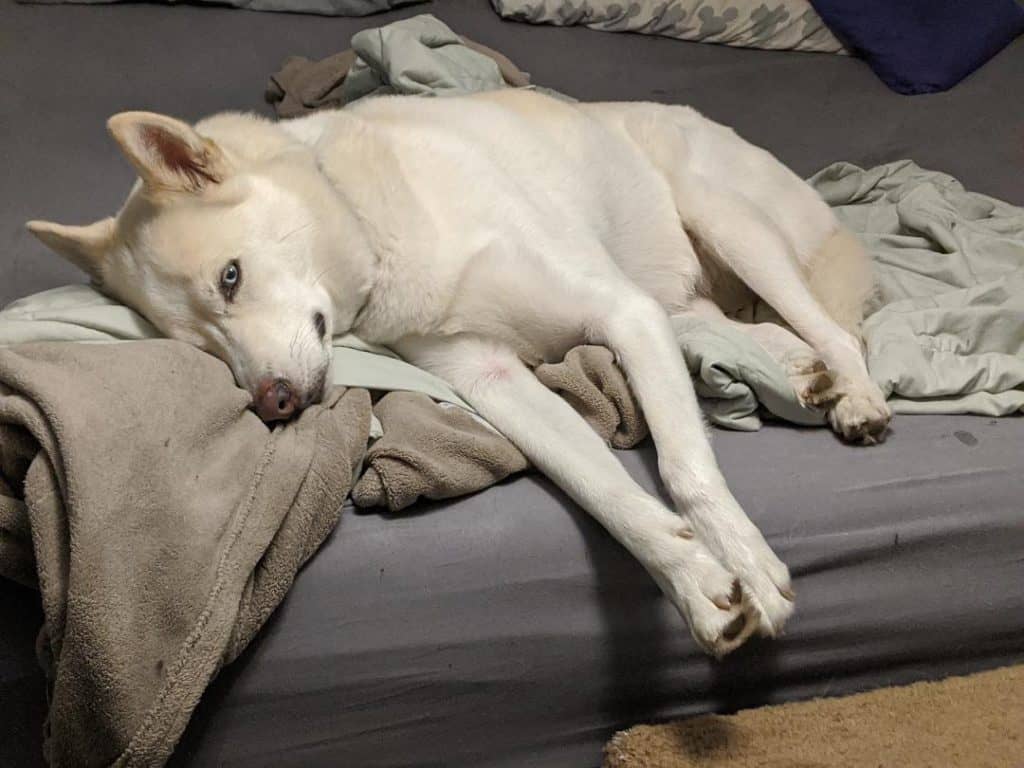
1. Try to remember what was in the trash and what your dog possibly consumed
This is important because depending on what your dog had access to will determine what steps you need to take.
2. Call your vet
Call your vet immediately if they might have ingested any type of string or twine, sharp objects, or anything toxic. These situations are life-threatening, and the odds of survival increase the sooner your dog can be seen. If your vet is not open, call or take your pet to an emergency clinic. If cost is an issue, there are health credit loans you can apply for to help cover the costs. It may be more expensive to delay the vet visit as the toxins or items then have more time to absorb into your pet’s system and travel further into the digestive tract causing more damage.
3. Monitor behavior, food/water intake, bathroom breaks
Your vet will want to know if there are any changes in these categories. If your dog appears to be more tired, anxious or even has an increase in energy, this can be a sign that they have ingested some sort of toxin or that they are in pain. The same can be said if they start drinking more water.
If they have stopped eating or drinking, this could mean that something they ate had caused a blockage in their digestive system. Watch them closely when they go to the bathroom. They could be suffering a blockage in their digestive system if they have stopped defecating.
Examine their fecal matter. Note if there is any blood or mucous in their feces. Blood can be a sign that there has been damage in their digestive tract that may need to be addressed.
4. Keep track of what is going in and out of Your dog
Your vet will appreciate this knowledge and it will help them (and you) make any decisions on what may need to be done. This will also help you make sure that are passing whatever it is they had eaten.
Tips to Keep Your Dog Out of the Trash
1. Move trash out of the way
The easiest way to keep your dog out of the trash is simply to remove it from their reach. Put the trash can in a cupboard or close off access to the room that the trash is in. This is not possible in all homes and of course, some dogs may figure out how to get to the trash anyway.
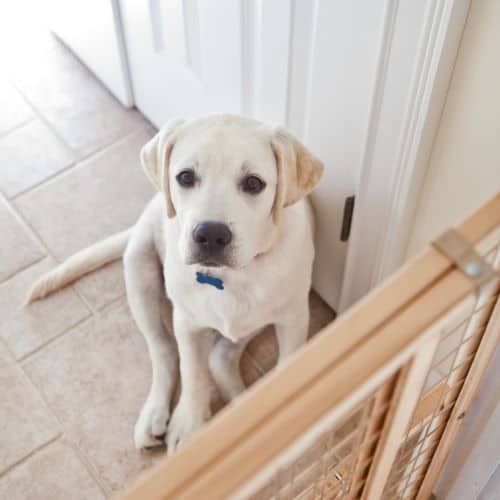
2. Empty when the good stuff is in it
Anytime you throw away things that you know your dog will be tempted by, take the trash out. This will usually be leftover food and food containers. This is another way to remove temptation while you work on training.
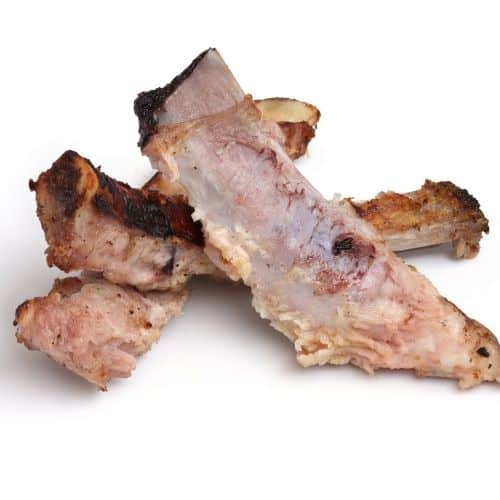
3. Train and strengthen the “Leave it” command
Work on the “leave it” command focusing on the trash can. Always make sure the reward is much better than what is in the trash. You can work up to putting the “good” stuff in the can when you are training. Just remember to remove it when the training session is finished. Once the behavior is trained with the trash, you will still want to take the trash out when you put the tempting stuff inside to be safe. That way if you forget to empty it, the chance that your dog will leave it alone will greatly increase because they are not used to the fun things being in there anymore.
Trash Can Hacks
There are several DIY trash can hacks to help keep your dog safe and your vet bills down that you can try.
1. Turn your trash can around
Depending on the type of lid on the trash can, simply turning it around to face the wall can make opening it more difficult.
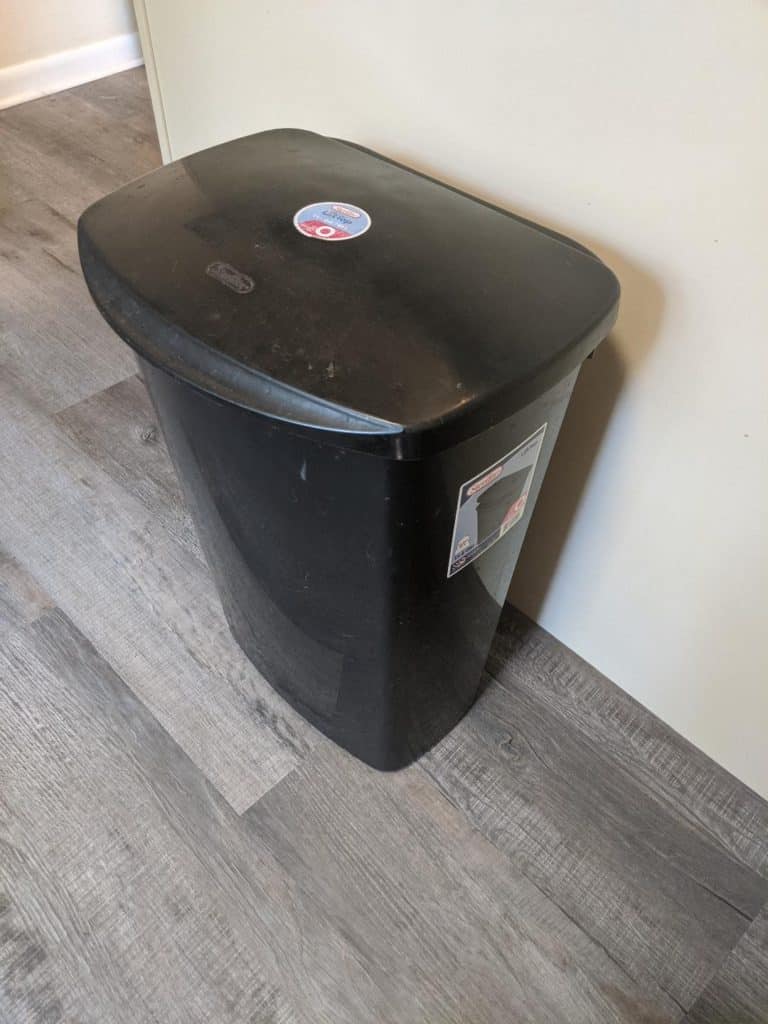
2. Put weight on top of the trash can lid
Adding weight to the can will make it harder to open the lid and push the trash can over. Just be careful not to put anything that can break on top of it or damage the floor (or another pet) if your dog does succeed in knocking it over.
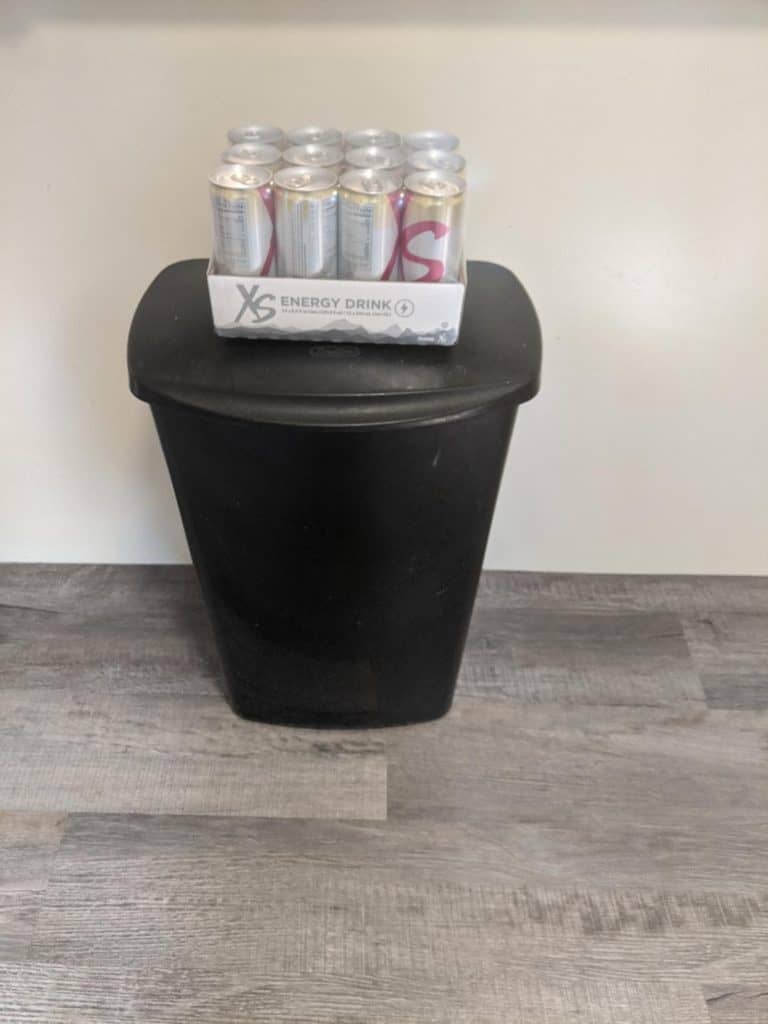
3. Put a box over the trash can
This is a great way to block your dogs from getting into the trash, but it is inconvenient when you must throw something away. Make sure the box goes over the can and covers it at least 1/3 of the way down. This method works because even if your dog knocks the trash can over, they will still need to shimmy the box off the fallen can to get to what is inside.
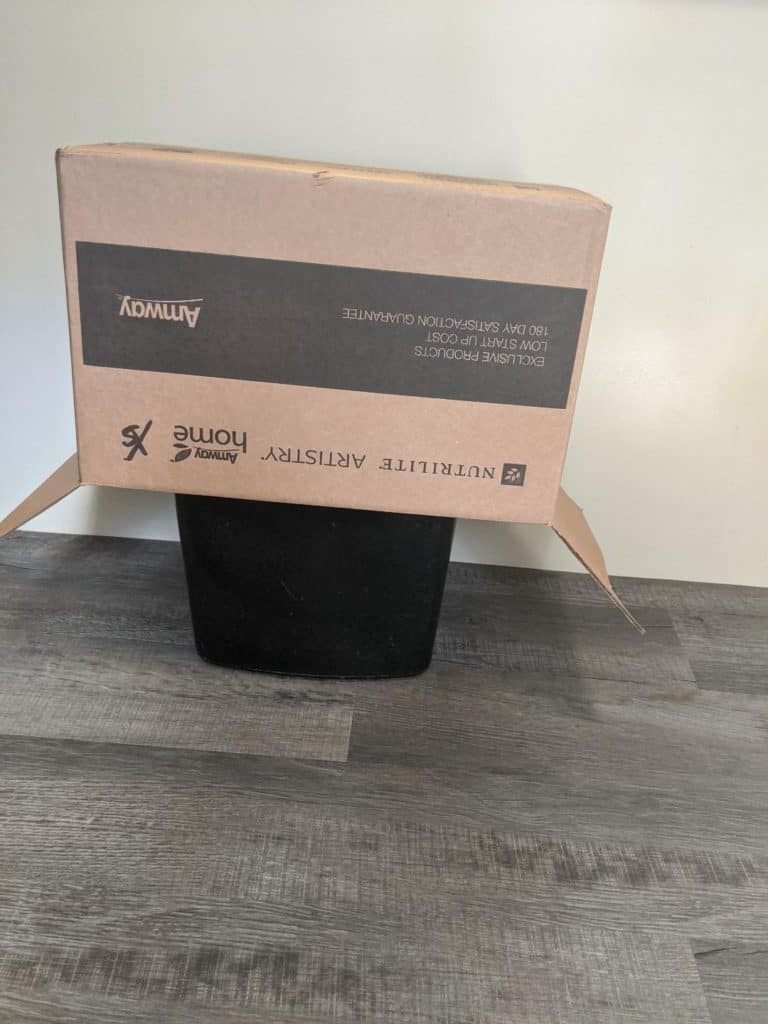
4. Get a sensor trash can but turn it to face the wall
You can get a motion-sensing trash can where the sensor is in the middle of the lid rim. When you turn it to face the wall, it makes it difficult if not impossible for a dog to trigger the sensor to open the trash can. Costco occasionally has good deals or here is one for $60 on Amazon.
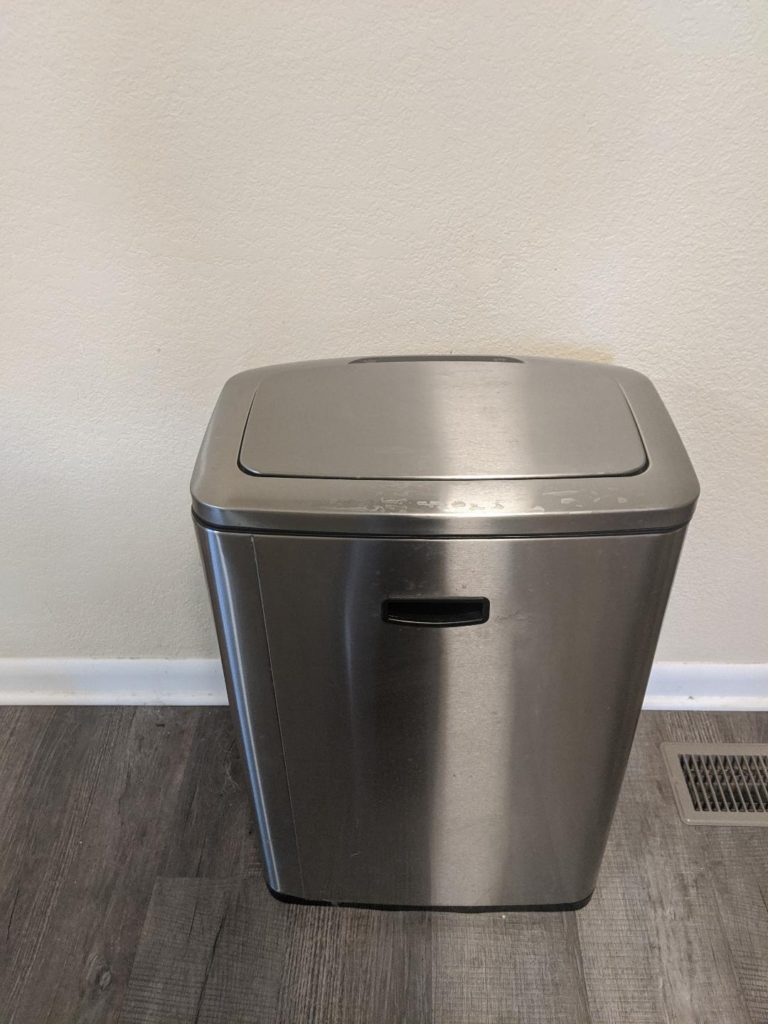
Get Started!
With a little bit of work and creativity, you can keep your dog safe and out of the trash. Accidents can and will happen, but armed with a little bit of knowledge, you can act quickly and give your vet the vital information required so they can make the best medical decision for you and your dog. Use these tips to limit the chances of your dog getting into something that can hurt them and avoiding a potentially messy clean-up. Comment below or send us an email if you have any questions!
Pin For Later:
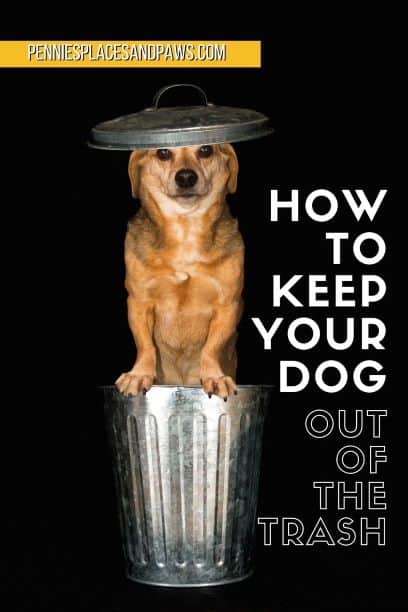
Amazon and the Amazon logo are trademarks of Amazon.com, Inc, or its affiliates.

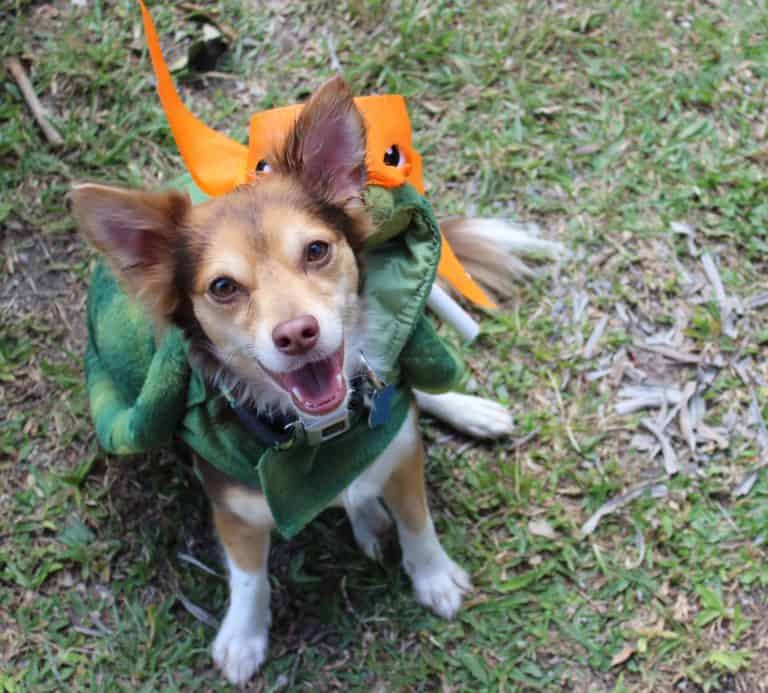
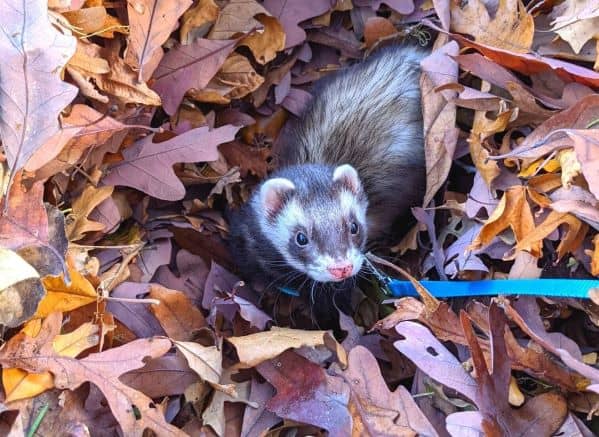
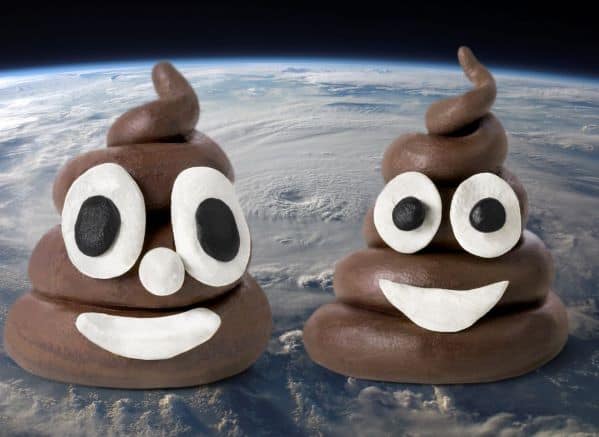



Having animals is a lot of work! Even cats have the same issue. I’ve had to learn to keep all food locked up as well!
It has forced me to be more on top of cleaning!! Lol
You have a smart dog, who can solve trash can puzzles! Wow! I am impressed with your perseverance and creativity. I am glad you found a solution that works!
Thanks! I learned how to be creative working at the zoo 😂
Oh, I loved this! And I actually cannot believe that sensor can from Costco was not more expensive! Kids and animals will definitely bring out the creativity in us!
I was happy we went to Costco that day!
I keep my trash in the cupboard under the kitchen sink, rather be safe than sorry but can say that Layla has never shown interest in it phew. Great post
It was never really a problem until our last dog, Emma. She definitely put my problem-solving skills to the test!
This is really great information. My niece has to make sure the garbage in the bathroom is covered, or the door is closed at all times. Her dog loves tissues and other things. I’ll share this post with her.
Thanks for the share!
These are some great tips! We had a problem with our one dog breaking into our plastic trash bins, so we invested in a nicer stainless steel bin. The latch on it was stronger and better designed, it latched within a frame on the garbage bin instead of leaving an overhang for the dogs to nose at. It worked great to keep them out! We have since switched over the bins in bathrooms, the kitchen and my office lol
Dogs definitely keep us on our toes and test our problem-solving skills! Ours had figured out the latch on their food bins, so those are now turned toward the wall too
We are low tech here, so my dog opening the lid is close to impossible, as well as she’s never alone to get a chance to get into mischief.
Turning the can around–so simple, so genius!
Thanks! I miss the days when we could be low tech LOL
Great tips! And it is so important to remember the trash can! Fortunately, even when I had five Huskies, this was not too much of an issue. I did have one who would step on the trash can to open it, but I caught on quick and when we remodeled our kitchen, I had a countertop extend out to slide the trash can under so the lid could not open! I have one of my FiveSibes remaining and he is just a happy senior who doesn’t get into much mischief anymore! Pinning this to share your awesome tips!
Thanks! Our husky, Emma is the one that gets into EVERYTHING!
I’m really lucky, my dogs have never gotten into the trash. Even though they’ve never raided the trash, I do wrap particularly dangerous & enticing items like chicken bones in double wrap, or put it into the outside trash bin. Great points in this post and I love all the remedies you’ve suggested to keep dogs away from the trash.
Love & Biscuits,
Dogs Luv Us and We Luv Them
Thanks! We learned quickly that the ‘good stuff’ needs to go to the trash bin ASAP so no one is tempted.
Truffle used to love getting into the trash can in my office. I ended up placing a box over the top of it.
A box is a great quick, easy, low cost fix 🙂